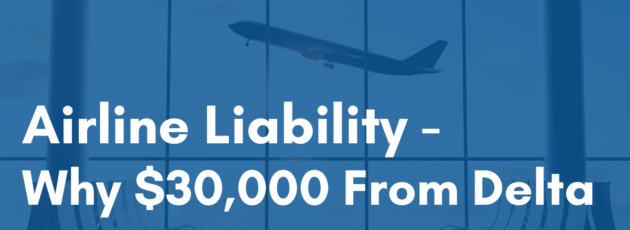We saw the year begin with several plane crashes and near misses. Who can forget the dramatic Southwest flight pulling up to avoid colliding with a private jet that had taxied into its path while landing at Chicago Midway? Or the dramatic video watched over and over again, where disaster wasn’t averted over the Potomac in January or on a runway in Toronto. Luckily, the outcome in Toronto was much better.
As you can imagine, not all passengers on those flights were on vacation several were traveling for work. So far, my team is handling a total of six claims from those two crashes in 2025 involving employees traveling for work. While the official causes have not been confirmed, the facts of the two events appear to be very different, as are the laws that apply.
Regardless of whether a flight is international or domestic, all airlines are governed by the Federal Aviation Act, which holds them to a higher degree of care in protecting their passengers from injury and can hold an airline liable for even the slightest degree of negligence.
Within hours of Delta Flight 4819’s crash landing, Delta was offering every passenger $30,000 no strings attached. The offer led to speculation about why Delta made the quick move. Anyone who works in claims understands the benefit of making a good-faith advance or early offer to settle a claim with large exposure, even if liability hasn’t been clearly established. But in Delta’s case, the answer lies in their Contract of Carriage, which includes a section outlining their liability and the requirement to make an advance payment under the Montreal Convention of 1999.
The Montreal Convention applies to international flights between two countries that are parties to the Convention. It establishes strict liability for bodily injury or death up to 155,800 Special Drawing Rights—which, as of December 2024, converted to approximately $202,500. The $30,000 offer was not an admission of liability, and acceptance does not waive passengers’ legal rights to sue.
Under the Convention’s strict liability clause, passengers may receive up to $202,500 without proving the airline or its agents were at fault for injury or death sustained while onboard. For damages above that amount, the passenger must prove negligence. To avoid liability for those higher damages, the airline must prove that the accident either:
- Was not due to the negligence or wrongful acts or omissions of the carrier or its agents
- Was solely due to a third party, such as an air traffic controller.
Of the 21 people who reported injuries, the majority were minor and did not require hospitalization. Many of the claims appear to be what are commonly referred to as mental-only claims. A mental injury without physical harm is not covered under the Montreal Convention. Whether any work-related mental health claims are compensable will depend on the jurisdiction governing the workers’ compensation claim. Time will tell if Delta is found negligent for the crash landing or if responsibility lies with the aircraft manufacturer or the airport. We do know the flight was delayed by an hour before departing Minneapolis.
American Flight 5342 was a domestic flight. As such, the Montreal Convention does not apply to American’s liability. While the cause is still under investigation, early indications point to a combination of tower understaffing at Reagan National Airport and a Blackhawk helicopter crew being allowed to fly at an altitude higher than authorized. If the military or air traffic controllers are found negligent in causing the mid-air collision during landing, the claims will fall under the Federal Tort Claims Act. The Act limits the government’s liability to actual damages and does not permit punitive damages. That’s why, of the 75 claims filed in the last decade alleging government fault, only $88.7 million was paid.
Advance payments like those made by Delta are not unusual, although they’re not always publicized as widely. After 9/11, families of passengers aboard the planes used in the attacks were compensated through a Victims’ Compensation Fund established by Congress, provided they agreed not to sue the airlines. Victims’ families from the Boeing 737 Max crashes in 2018 and 2019 received a pro-rata share of a $50 million fund established by Boeing approximately $144,500 per family of the 346 passengers killed. Like Delta’s offer, Boeing’s payment came with no strings attached and was not an admission of liability. However, unlike Delta, Boeing’s payment came much later—just before Congress was scheduled to hear testimony from victims’ families.
As insurance professionals, it’s important for us to understand the various laws that impact the claims we handle whether they arise on the ground or in the air.
